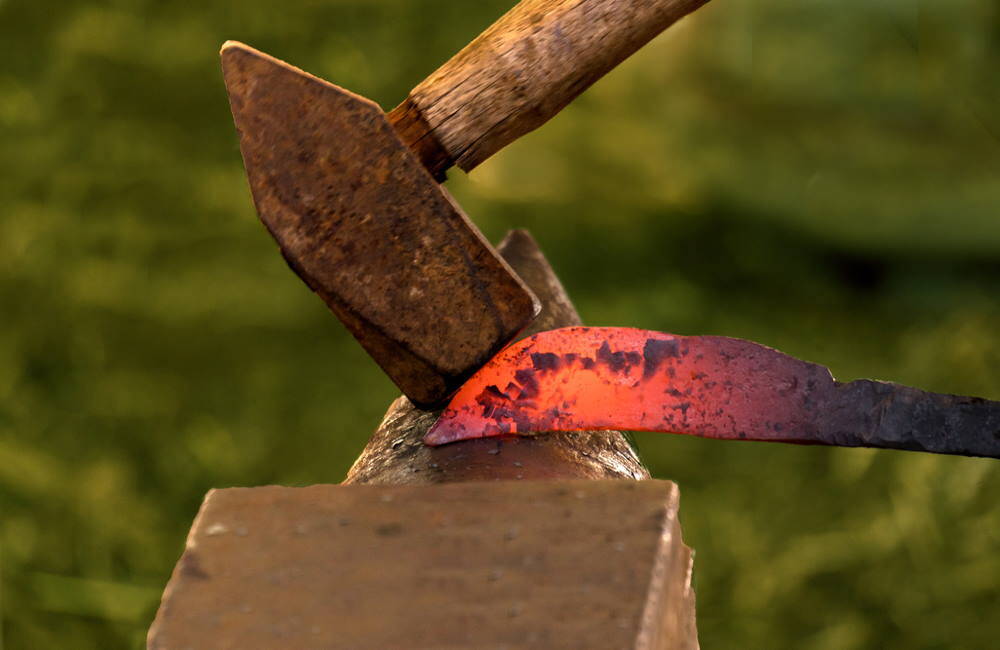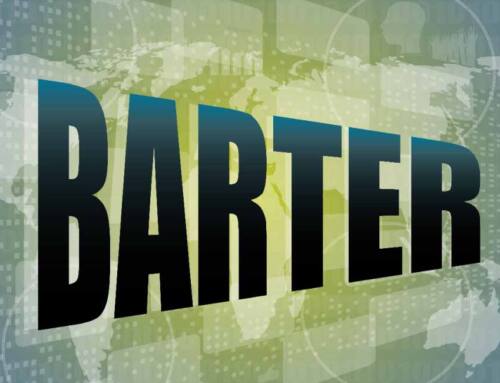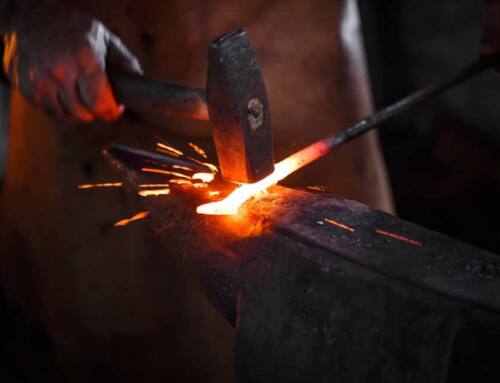Some forged knives, fixed blades for example, are made from a single bar of steel, heated in a forge and then hammered into shape. Other forged knives are more complicated as they are made from combining different steels, folded, twisted and hammered to create Damascus steel. Some experts and knife owners have long considered forged knives as higher quality blades because of how they are painstakingly made, and the craftsmanship involved, but it all comes down to the “feel” of the knife and what’s right for you.
What are Knife Handles Made Of?
There are multiple methods in the mass-manufacturing of knives. One alternative to a forged knife is knife stamping. Stamped knives are a mass production method which is done by stamping out multiple quantities from a large sheet of metal. There are then several steps before the knife is completed. Some of the steps required are surface grinding, heat treatment, grinding the main bevel, and creating the handles and bolsters, if needed. Both forged knives and manufactured knives are available for buyers, but there are vast distinctions that separate the two, especially in the eyes of knife enthusiasts.
Forged vs Manufactured
In knife making, forged knives take longer to create and require a higher level of individualized craftsmanship. That’s especially of value to knife collectors looking for pride of ownership of hand crafted, custom knives. The time it takes to develop skill and mastery of the forge, the tools and the materials can take years. Being an apprentice to a master knife maker is ideal. This vocation requires much from the student and is usually a passion of the knife maker.
Manufactured knives are usually less expensive than individually made, forged knives. Nearly all kitchen knives are mass produced in varying levels of quality and are adequate for the work of home food prep. There are also folding and fixed blade EDC knives that are mass produced with varying levels of quality. The level of quality in a mass produced knife will depend on many aspects of the process, some aspects being budget, project management, level of skill of the factory, condition of the machines, purity of the materials and skill of the designer and engineer. There are several methods of manufacturing. One is the stamp method. A manufacturer may choose the stamp method of manufacturing for several reasons. Two of those factors are quantity to stamp and the manufacturer’s production budget. While there are manufactured knives that can hold up to regular EDC use, you want to ensure the brand you choose is time-tested and trusted.
Forged Knives Examples
There is prestige in carrying a sought-after knife maker’s handmade knife and can be an important aspect of selecting a forged knife as your EDC. Many knife enthusiasts have such a love affair with the forging process that they begin to learn how to forge their own blades. You can build your own forge to forge your own knife, but just know that option does have a high learning curve and high investment of time and money.. Most people have their favorite craftsmen that they buy their forged knives from and, though they dream of it, never take on building their own forge.
Manufactured Knife Examples
High quality forged knives for the kitchen are available, but this can be a costly option. Your average, manufactured, kitchen cutlery usually takes a lot of abuse and is not well cared for. This is because they are inexpensive and not regarded or cared for in the same way a forged knife should be. The kitchen version of manufactured knives often does not have a bolster and the tang often runs along just half or one-third of the handle keeping the cost of manufacturing down.
Knife Making FAQs
Some of the frequent questions on forged knives include the following:
Are Knives Forged in Fire Good? Although there are some high-quality manufactured knife brands, typically, forged knives are more unique because they’re handmade. They can have more exotic metals, handle materials and finishes. It isn’t the forge that makes the knife “good”, it is the hands and mind and experience of the knifemaker that sets the knife apart.
Are Forged Knives Better Than Manufactured Knives? Much of the issue comes down to “feel.” A forged knife, which can be heavier and sturdier, can feel better in your hand. That “feel” can be perceived as a more enjoyable cutting experience. A quality manufactured knife is designed with balance, feel and utility in mind and can often surpass the functionality of a forged knife. Thumb wedges, ergonomic positioning, uniformity, replaceability and various design features can make manufactured knives a better choice for EDC.
How Will I Know It’s a Forged Knife? Nothing is 100% certain, and some may try to pass off manufactured blades as forged, but look for the maker’s mark on the knife and always buy from a trusted knifemaker.
Is A Forged Knife a Good EDC Knife? Carrying a forged blade is a personal choice. If owning a one-of-a-kind is important, and you can afford it, then the forged blade is the way to go. However, many people feel that manufactured knives are best for their personal EDC. Those in the EDC community like to switch out their daily carry with multiple knives, brands, styles and sizes. This is a fun aspect of the EDC movement that may be cost prohibitive if attempted with hand crafted, forged blades.







Leave A Comment